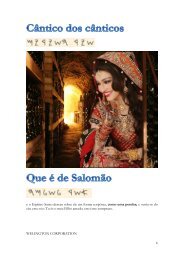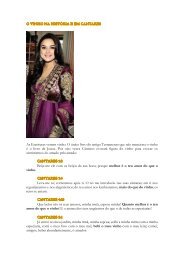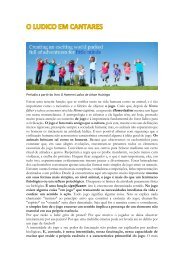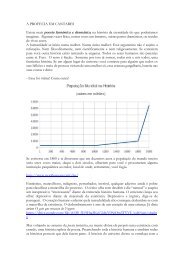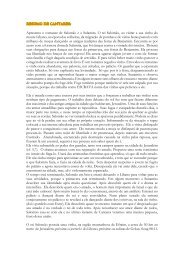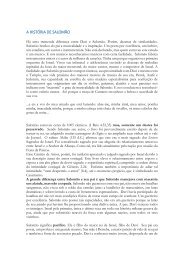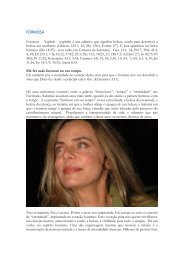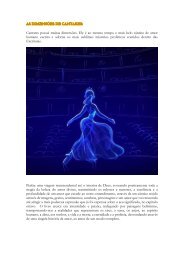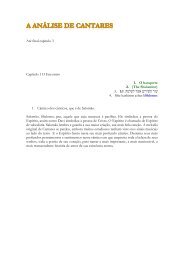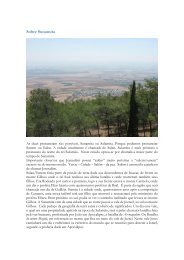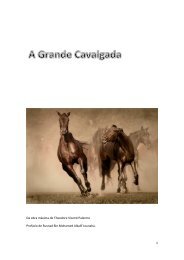- Page 3:
CORNELL UNIVERSITY LIBRARY 3 1924 0
- Page 6:
yy a Cornell University Library The
- Page 9:
THE LIFE AND EXPLOITS ALEXANDER THE
- Page 13:
THE LIFE AND EXPLOITS OF ALEXANDER
- Page 17 and 18:
"QJow pate gofMtg Awi hiit^ (^teU "
- Page 19 and 20:
PREFACE. The object of this work is
- Page 21 and 22:
PREFACE. The object of this work is
- Page 23 and 24:
PREFACE. XI death of Alexander were
- Page 25 and 26:
PREFACE. XIII Dr. C. F. August Dill
- Page 27:
PREFACE. XV be many who, while wish
- Page 30 and 31:
II INTRODUCTION. inside of the boar
- Page 32 and 33:
IV INTRODUCTION. Description iv. Th
- Page 34 and 35:
VI INTRODUCTION. mass of fictitious
- Page 36 and 37:
VIII INTRODUCTION. "of living capti
- Page 38 and 39:
INTRODUCTION. Egyptian and the son
- Page 40 and 41:
XII INTRODUCTION. dead to protect t
- Page 42 and 43:
XIV INTRODUCTION. Bk. I. chap. 5, a
- Page 44 and 45:
XVI INTRODUCTION. and both figures
- Page 46 and 47:
XVIII INTRODUCTION. Beasts and a sp
- Page 48 and 49:
XX INTRODUCTION. Latin ver- From Gr
- Page 50 and 51:
XXII INTRODUCTION. Syriac "Christia
- Page 52 and 53:
XXIV INTRODUCTION. other Euro- But
- Page 54 and 55:
XXVI INTRODUCTION. of traditions co
- Page 56 and 57:
XXVIII INTRODUCTION. shewed itself
- Page 58 and 59:
XXX INTRODUCTION. disgraceful thing
- Page 60 and 61:
XXXII INTRODUCTION. and are boldly
- Page 62 and 63:
XXXIV INTRODUCTION. dead bodies of
- Page 64 and 65:
Job and Pharaoh, Solomon's wisdom.
- Page 66 and 67:
XXXVIII INTRODUCTION. succeeded in
- Page 68 and 69:
XL INTRODUCTION. its turn, have acq
- Page 70 and 71:
XLII INTRODUCTION. of the Assyrian
- Page 72 and 73:
XLIV INTRODUCTION. enlarged, and wh
- Page 74 and 75:
XLVI INTRODUCTION. Letter to i" scv
- Page 76 and 77:
XLVIII INTRODUCTION. Alexander ill.
- Page 78 and 79:
INTRODUCTION. "awe or reverence, fo
- Page 80 and 81:
LII INTRODUCTION. he arrives in the
- Page 82 and 83:
LIV INTRODUCTION. Chap. XXV. Alexan
- Page 84 and 85:
2 THE HISTORY OF ALEXANDER THE GREA
- Page 86 and 87:
4 THE HISTORY OF ALEXANDER THE GREA
- Page 88 and 89:
6 THE HISTORY OF ALEXANDER THE GREA
- Page 90 and 91:
6 THE HISTORY OF ALEXANDER THE GREA
- Page 92 and 93:
lO THE HISTORY OF ALEXANDER THE GRE
- Page 94 and 95:
12 THE HISTORY OF ALEXANDER THE GRE
- Page 96 and 97:
14 THE HISTORY OF ALEXANDER THE GRE
- Page 98 and 99:
1 THE HISTORY OF ALEXANDER THE GREA
- Page 100 and 101:
THE HISTORY OF ALEXANDER THE GREAT.
- Page 102 and 103:
20 THE HISTORY OF ALEXANDER THE GRE
- Page 104 and 105:
2 2 THE HISTORY OF ALEXANDER THE GR
- Page 106 and 107:
24 THE HISTORY OF ALEXANDER THE GRE
- Page 108 and 109:
2 6 THE HISTORY OF ALEXANDER THE GR
- Page 110 and 111:
2 8 THE HISTORY OF ALEXANDER THE GR
- Page 112 and 113:
30 THE HISTORY OF ALEXANDER THE GRE
- Page 114 and 115:
32 THE HISTORY OF ALEXANDER THE GRE
- Page 116 and 117:
34 THE HISTORY OF ALEXANDER THE GRE
- Page 118 and 119:
36 THE HISTORY OF ALEXANDER THE GRE
- Page 120 and 121:
38 THE HISTORY OF ALEXANDER THE GRE
- Page 122 and 123:
40 THE HISTORY OF ALEXANDER THE GRE
- Page 124 and 125:
42 THE HISTORY OF ALEXANDER THE GRE
- Page 126 and 127:
44 THE HISTORY OF ALEXANDER THE GRE
- Page 128 and 129:
4-6 THE HISTORY OF ALEXANDER THE GR
- Page 130 and 131:
48 THE HISTORY OF ALEXANDER THE GRE
- Page 132 and 133:
50 THE HISTORY OF ALEXANDER THE GRE
- Page 134 and 135:
52 THE HISTORY OF ALEXANDER THE GRE
- Page 136 and 137:
54 THE HISTORY OF ALEXANDER THE GRE
- Page 138 and 139:
56 THE HISTORY OF ALEXANDER THE GRE
- Page 140 and 141:
58 THE HISTORY OF ALEXANDER THE GRE
- Page 142 and 143:
6o THE HISTORY OF ALEXANDER THE GRE
- Page 144 and 145:
62 THE HISTORY OF ALEXANDER THE GRE
- Page 146 and 147:
64 THE HISTORY OF ALEXANDER THE GRE
- Page 148 and 149:
66 THE HISTORY OF ALEXANDER THE GRE
- Page 150 and 151:
68 THE HISTORY OF ALEXANDER THE GRE
- Page 152 and 153:
JO THE HISTORY OF ALEXANDER THE GRE
- Page 154 and 155:
72 THE HISTORY OF ALEXANDER THE GRE
- Page 156 and 157:
74 THE HISTORY OF ALEXANDER THE GRE
- Page 158 and 159:
^6 ; THE HISTORY OF ALEXANDER THE G
- Page 160 and 161:
y8 THE HISTORY OF ALEXANDER THE GRE
- Page 162 and 163:
So THE HISTORY OF ALEXANDER THE GRE
- Page 164 and 165:
82 THE HISTORY OF ALEXANDER THE GRE
- Page 166 and 167:
84 THE HISTORY OF ALEXANDER THE GRE
- Page 168 and 169:
86 THE HISTORY OF ALEXANDER THE GRE
- Page 170 and 171:
50 THE HISTORY OF ALEXANDER THE GRE
- Page 172 and 173:
QO THE HISTORY OF ALEXANDER THE GRE
- Page 174 and 175:
92 THE HISTORY OF ALEXANDER THE GRE
- Page 176 and 177:
94 THE HISTORY OF ALEXANDER THE GRE
- Page 178 and 179:
96 THE HISTORY OF ALEXANDER THE GRE
- Page 180 and 181:
gS THE HISTORY OF ALEXANDER THE GRE
- Page 182 and 183:
lOO THE HISTORY OF ALEXANDER THE GR
- Page 184 and 185:
I02 THE HISTORY OF ALEXANDER THE GR
- Page 186 and 187:
I04 THE HISTORY OF ALEXANDER THE GR
- Page 188 and 189:
I06 THE HISTORY OF ALEXANDER THE GR
- Page 190 and 191:
I08 THE HISTORY OF ALEXANDER THE GR
- Page 192 and 193:
I I O THE HISTORY OF ALEXANDER THE
- Page 194 and 195:
I I 2 THE HISTORY OF ALEXANDER THE
- Page 196 and 197:
I 1 4 THE HISTORY OF ALEXANDER THE
- Page 198 and 199:
I 1 6 THE HISTORY OF ALEXANDER THE
- Page 200 and 201:
I 1 8 TFIE HISTORY OF ALEXANDER THE
- Page 202 and 203:
I 20 THE HISTORY OF ALEXANDER THE G
- Page 204 and 205:
I 2 2 THE HISTORY OF ALEXANDER. THE
- Page 206 and 207:
124 THE HISTORY OF ALEXANDER THE GR
- Page 208 and 209:
126 THE HISTORY OF ALEXANDER THE GR
- Page 210 and 211:
128 THE HISTORY OF ALEXANDER THE GR
- Page 212 and 213:
130 THE HISTORY OF ALEXANDER THE GR
- Page 214 and 215:
132 THE HISTORY OF ALEXANDER THE GR
- Page 216 and 217:
134 THE HISTORY OF ALEXANDER THE GR
- Page 218 and 219:
136 THE HISTORY OF ALEXANDER THE GR
- Page 220 and 221:
138 THE HISTORY OF ALEXANDER THE GR
- Page 222 and 223:
140 THE HISTORY OF ALEXANDER THE GR
- Page 224 and 225:
142 THE HISTORY OF ALEXANDER THE GR
- Page 226 and 227:
144 THE HISTORY OF ALEXANDER THE GR
- Page 228 and 229:
146 THE HISTORY OF ALEXANDER THE GR
- Page 230 and 231:
148 THE HISTORY OF ALEXANDER THE GR
- Page 232 and 233:
Three hun- to bind the beast,' with
- Page 234 and 235:
152 THE HISTORY OF ALEXANDER THE GR
- Page 236 and 237:
154 THE HISTORY OF ALEXANDER THE GR
- Page 238 and 239:
156 THE HISTORY OF ALEXANDER THE GR
- Page 240 and 241:
158 THE HISTORY OF ALEXANDER THE GR
- Page 242 and 243:
l6o THE HISTORY OF ALEXANDER THE GR
- Page 244 and 245:
1 62 THE HISTORY OF ALEXANDER THE G
- Page 246 and 247:
164 THE HISTORY OF ALEXANDER THE GR
- Page 248 and 249: 1 66 THE HISTORY OF ALEXANDER THE G
- Page 250 and 251: 1 68 THE HISTORY OF ALEXANDER THE G
- Page 252 and 253: 170 THE HISTORY OF ALEXANDER THE GR
- Page 254 and 255: 172 THE HISTORY OF ALEXANDER THE GR
- Page 256 and 257: 174 I'HE HISTORY OF ALEXANDER THE G
- Page 258 and 259: 176 THE HISTORY OF ALEXANDER THE GR
- Page 260 and 261: 178 THE HISTORY OF ALEXANDER THE GR
- Page 262 and 263: l8o THE HISTORY OF ALEXANDER THE GR
- Page 264 and 265: 162 I THE HISTORY OF ALEXANDER THE
- Page 266 and 267: 184 THE HISTORY OF ALEXANDER THE GR
- Page 268 and 269: 1 86 THE HISTORY OF ALEXANDER THE G
- Page 270 and 271: THE HISTORY OF ALEXANDER THE GREAT.
- Page 272 and 273: I go THE HISTORY OF ALEXANDER THE G
- Page 274 and 275: 192 THE HISTORY OF ALEXANDER THE GR
- Page 276 and 277: 194 THE HISTORY OF ALEXANDER THE GR
- Page 278 and 279: 196 THE HISTORY OF ALEXANDER THE GR
- Page 280 and 281: I go THE HISTORY OF ALEXANDER THE G
- Page 282 and 283: 200 THE HISTORY OF ALEXANDER THE GR
- Page 284 and 285: 202 THE HISTORY OF ALEXANDER THE GR
- Page 286 and 287: age. 204 THE HISTORY OF ALEXANDER T
- Page 288 and 289: 206 THE HISTORY OF ALEXANDER THE GR
- Page 290 and 291: Alexander 2o8 THE HISTORV OF ALEXAN
- Page 292 and 293: 2IO THE HISTORY OF ALEXANDER THE GR
- Page 294 and 295: 212 THE HISTORY OF ALEXANDER THE GR
- Page 296 and 297: 214 THE HISTORY OF ALEXANDER THE GR
- Page 300 and 301: 2l8 THE HISTORY OF ALEXANDER THE GR
- Page 302 and 303: 2 20 THE HISTORY OF ALEXANDER THE G
- Page 304 and 305: 22 2 THE HISTORY OF ALEXANDER THE G
- Page 306 and 307: "' to the great ^°So Alexander mar
- Page 308 and 309: 2 26 THE HISTORY OF ALEXANDER THE G
- Page 310 and 311: 2 28 THE HISTORY OF ALEXANDER THE G
- Page 312 and 313: 230 THE HISTORY OF ALEXANDER THE GR
- Page 314 and 315: 232 THE HISTORY OF ALEXANDER THE GR
- Page 316 and 317: 2 34 THE HISTORY OF ALEXANDER THE G
- Page 318 and 319: 236 THE HISTORY OF ALEXANDER THE GR
- Page 320 and 321: 238 THE HISTORY OF ALEXANDER THE GR
- Page 322 and 323: 240 TFIE HISTORY OF ALEXANDER THE G
- Page 324 and 325: 242 THE HISTORY OF ALEXANDER THE GR
- Page 326 and 327: 244 THE HISTORY OF ALEAXNDER THE GR
- Page 328 and 329: 246 THE HISTORY OF ALEXANDER THE GR
- Page 330 and 331: 248 THE HISTORY OF ALEXANDER THE GR
- Page 332 and 333: 250 THE HISTORY OF ALEXANDER THE GR
- Page 334 and 335: 252 THE HISTORY OF ALEXANDER THE GR
- Page 336 and 337: 2 54 THE HISTORY OF ALEXANDER THE G
- Page 338 and 339: 256 THE HISTORY OF ALEXANDER THE GR
- Page 340 and 341: ?58 THE HISTORY OF ALEXANDER THE GR
- Page 342 and 343: 26o THE HISTORY OF ALEXANDER THE GR
- Page 344 and 345: 262 THE HISTORY OF ALEXANDER THE GR
- Page 346 and 347: 264 THE HISTORY OF ALEXANDER THE GR
- Page 348 and 349:
2 66 THE HISTORY OF ALEXANDER THE G
- Page 350 and 351:
to life. 268 THE HISTORY OF ALEXAND
- Page 352 and 353:
270 THE HISTORY OF ALEXANDER THE GR
- Page 354 and 355:
272 THE HISTORY OF ALEXANDER THE GR
- Page 356 and 357:
2/4 THE HISTORY OF ALEXANDER THE GR
- Page 358 and 359:
276 THE HISTORY OF ALEXANDER THE GR
- Page 360 and 361:
2/8 THE HISTORY OF ALEXANDER THE GR
- Page 362 and 363:
2 8o THE HISTORY OF ALEXANDER THE G
- Page 364 and 365:
282 THE HISTORY OF ALEXANDER THE GR
- Page 366 and 367:
284 THE HISTORY OF ALEXANDER THE GR
- Page 368 and 369:
2 86 THE HISTORY OF ALEXANDER THE G
- Page 370 and 371:
2 88 THE HISTORY OF ALEXANDER THE G
- Page 372 and 373:
290 THE HISTORY OF ALEXANDER THE GR
- Page 374 and 375:
292 THE HISTORY OF ALEXANDER THE GR
- Page 376 and 377:
Alexander's address to Rahimdn. 294
- Page 378 and 379:
296 THE HISTORY OF ALEXANDER THE GR
- Page 380 and 381:
298 THE HISTORY OF ALEXANDER THE GR
- Page 382 and 383:
300 THE HISTORY OF ALEXANDER THE GR
- Page 384 and 385:
302 THE HISTORY OF ALEXANDER THE GR
- Page 386 and 387:
304 THE HISTORY OF ALEXANDER THE GR
- Page 388 and 389:
^o6 THE HISTORY OF ALEXANDER THE GR
- Page 390 and 391:
308 THE HISTORY OF ALEXANDER THE GR
- Page 392 and 393:
3IO THE HISTORY OF ALEXANDER THE GR
- Page 394 and 395:
312 THE HISTORY OF ALEXANDER THE GR
- Page 396 and 397:
314 THE HISTORY OF ALEXANDER THE GR
- Page 398 and 399:
3l6 THE HISTORY OF ALEXANDER THE GR
- Page 400 and 401:
31 8 THE HISTORY OF ALEXANDER THE G
- Page 402 and 403:
320 THE HISTORY OF ALEXANDER THE GR
- Page 404 and 405:
32 2 THE HISTORY OF ALEXANDER THE G
- Page 406 and 407:
324 THE HISTORY OF ALEXANDER THE GR
- Page 408 and 409:
326 THE HISTORY- OF ALEXANDER THE G
- Page 410 and 411:
J 28 THE HISTORY OF ALEXANDER THE G
- Page 412 and 413:
3oO THE HISTORY OF ALEXANDER THE GR
- Page 414 and 415:
332 THE HISTORY OF ALEXANDER THE GR
- Page 416 and 417:
"each of them was twelve cubits/ An
- Page 418 and 419:
336 THE HISTORY OF ALEXANDER THE GR
- Page 420 and 421:
338 THE HISTORY OF ALEXANDER THE GR
- Page 422 and 423:
340 THE HISTORY OF ALEXANDER THE GR
- Page 424 and 425:
342 THE HISTORY OF ALEXANDER THE GR
- Page 426 and 427:
344 THE HISTORY OF ALEXANDER THE GR
- Page 428 and 429:
346 THE HISTORY OF ALEXANDER THE GR
- Page 430 and 431:
348 THE HISTORY OF ALEXANDER THE GR
- Page 432 and 433:
350 THE HISTORY OF ALEXANDER THE GR
- Page 434 and 435:
j3- THE HISTORY OF ALEXANDER THE GR
- Page 437 and 438:
THE HISTORY OF ALEXANDER THE GREAT
- Page 439 and 440:
BY AL-MAKIN. 357 deliberations on t
- Page 441 and 442:
BY AL-MAKIN. 359 "mans, and the fir
- Page 443 and 444:
BY AL-MAkIn. 361 "thou take with th
- Page 445 and 446:
BY AL-MAKIN. 363 "and gather togeth
- Page 447 and 448:
BY AL-MAKIN. 365 yet the breath of
- Page 449 and 450:
BY AL-MAKIN. 367 ones in their plac
- Page 451 and 452:
BY AL-MAKIN. 369 ordered them to do
- Page 453 and 454:
BY AL-MAKIN. 3/1 "stature, and migh
- Page 455 and 456:
BY AL-MAKIN. 373 with him took both
- Page 457 and 458:
BY AL-MAKIN. 375 her,' and he spake
- Page 459 and 460:
BY AL-MAKIN. 377 i. And Aristotle s
- Page 461 and 462:
BY AL-MAKIN. 379 xvii. Another said
- Page 463 and 464:
BY AL-MAKIN. 38 I were thirty-two y
- Page 465 and 466:
BY AL-MAKIN. 383 and to beat the dr
- Page 467:
BY AL-MAKIN. 385 twenty stars, and
- Page 470 and 471:
388 THE HISTORY OF ALEXANDER THE GR
- Page 472 and 473:
3 go THE HISTORY OF ALEXANDER THE G
- Page 474 and 475:
392 THE HISTORY OF ALEXANDER THE GR
- Page 476 and 477:
394 '^HE HISTORY OF ALEXANDER THE G
- Page 478 and 479:
396 THE HISTORY OF ALEXANDER THE GR
- Page 480 and 481:
THE HISTORY OF ALEXANDER THE GREAT
- Page 482 and 483:
4O0 THE HISTORY OF ALEXANDER THE GR
- Page 485 and 486:
THE HISTORY OF ALEXANDER THE GREAT
- Page 487 and 488:
BY JOSEPH BEN-GORION. 405 shouts an
- Page 489 and 490:
BY JOSEPH BEN-GORION. 407 like ligh
- Page 491 and 492:
BY JOSEPH BEN-GORION. 4O9 do]. Then
- Page 493 and 494:
BY JOSEPH BEN-GORION. 411 "be peace
- Page 495 and 496:
BY JOSEPH BEN-GORION. 413 wealth in
- Page 497 and 498:
BY JOSEPH BEN-GORION. 415 and the c
- Page 499 and 500:
BY JOSEPH BEN-GORION. 417 and the c
- Page 501 and 502:
BY JOSEPH BEN-GORION. 4I9 And it ca
- Page 503 and 504:
BY JOSEPH BEN-GORION. 42 I "in comb
- Page 505 and 506:
BY JOSEPH BEN-GORION. 423 "[it] as
- Page 507 and 508:
BY JOSEPH BEN-GORION. 425 "of my ow
- Page 509 and 510:
BY JOSEPH BEN-GORION. 427 a deadly
- Page 511 and 512:
THE HISTORY OF THE DEATH OF ALEXAND
- Page 513 and 514:
BY AN ANONYMOUS WRITER. 43 "that wh
- Page 515 and 516:
BY AN ANONYMOUS WRITER. 433 vii. Li
- Page 517:
BY AN ANONYMOUS WRITER. 435 "to me
- Page 520 and 521:
438 THE HISTORY OF ALEXANDER THE GR
- Page 522 and 523:
440 THE HISTORY OF ALEXANDER THE GR
- Page 524 and 525:
442 THE HISTORY OF ALEXANDER THE GR
- Page 526 and 527:
444 THE HISTORY OF ALEXANDER THE GR
- Page 528 and 529:
446 THE HISTORY OF ALEXANDER THE GR
- Page 530 and 531:
448 THE HISTORY OF ALEXANDER THE GR
- Page 532 and 533:
450 THE HISTORY OF ALEXANDER THE GR
- Page 534 and 535:
452 THE HISTORY OF ALEXANDER THE GR
- Page 536 and 537:
454 THE HISTORY OF ALEXANDER THE GR
- Page 538 and 539:
456 THE HISTORY OF ALEXANDER THE GR
- Page 540 and 541:
458 THE HISTORY OF ALEXANDER THE GR
- Page 542 and 543:
460 THE HISTORY OF ALEXANDER THE GR
- Page 544 and 545:
462 THE HISTORY OF ALEXANDER THE GR
- Page 546 and 547:
464 THE HISTORY OF ALEXANDER THE GR
- Page 548 and 549:
466 THE HISTORY OF ALEXANDER THE GR
- Page 550 and 551:
468 THE HISTORY OF ALEXANDER THE GR
- Page 552 and 553:
470 THE HISTORY OF ALEXANDER THE GR
- Page 554 and 555:
472 THE HISTORY OF ALEXANDER THE GR
- Page 556 and 557:
474 THE HISTORY OF ALEXANDER THE GR
- Page 558 and 559:
476 THE HISTORY OF ALEXANDER THE GR
- Page 560 and 561:
4/8 THE HISTORY OF ALEXANDER THE GR
- Page 562 and 563:
480 THE HISTORY OF ALEXANDER THE GR
- Page 564 and 565:
'''' 482 THE HISTORY OF ALEXANDER T
- Page 566 and 567:
THE HISTORY OF ALEXANDER THE GREAT.
- Page 568 and 569:
486 THE HISTORY OF ALEXANDER THE GR
- Page 570 and 571:
488 THE HISTORY OF ALEXANDER THE GR
- Page 572 and 573:
490 THE HISTORY OF ALEXANDER THE GR
- Page 574 and 575:
492 THE HISTORY OF ALEXANDER THE GR
- Page 576 and 577:
494 THE HISTORY OF ALEXANDER THE GR
- Page 578 and 579:
496 THE HISTORY OF ALEXANDER THE GR
- Page 580 and 581:
498 THE HISTORY OF ALEXANDER THE GR
- Page 582 and 583:
500 THE HISTORY OF ALEXANDER THE GR
- Page 584 and 585:
502 THE HISTORY OF ALEXANDER THE GR
- Page 586 and 587:
504 THE HISTORY OF ALEXANDER THE GR
- Page 588 and 589:
506 THE HISTORY OF ALEXANDER THE GR
- Page 590 and 591:
5o8 THE HISTORY OF ALEXANDER THE GR
- Page 592 and 593:
5IO THE HISTORY OF ALEXANDER THE GR
- Page 594 and 595:
512 THE HISTORY OF ALEXANDER THE GR
- Page 596 and 597:
514 THE HISTORY OF ALEXANDER THE GR
- Page 598 and 599:
5 1 6 THE HISTORY OF ALEXANDER THE
- Page 600 and 601:
king^s. 518 THE HISTORY OF ALEXANDE
- Page 602 and 603:
520 THE HISTORY OF ALEXANDER THE GR
- Page 604 and 605:
522 THE HISTORY OF ALEXANDER THE GR
- Page 606 and 607:
524 THE HISTORY OF ALEXANDER THE GR
- Page 608 and 609:
526 THE HISTORY OF ALEXANDER THE GR
- Page 610 and 611:
528 THE HISTORY OF ALEXANDER THE GR
- Page 612 and 613:
530 THE HISTORY OF ALEXANDER THE GR
- Page 614 and 615:
532 THE HISTORY OF ALEXANDER THE GR
- Page 616 and 617:
534 THE HISTORY OF ALEXANDER THE GR
- Page 618 and 619:
53^ THE HISTORY OF ALEXANDER THE GR
- Page 620 and 621:
538 THE HISTORY OF ALEXANDER THE GR
- Page 622 and 623:
540 THE HISTORY OF ALEXANDER THE GR
- Page 624 and 625:
542 THE HISTORY OF ALEXANDER THE GR
- Page 626 and 627:
544 THE HISTORY OF ALEXANDER THE GR
- Page 628 and 629:
546 THE HISTORY OF ALEXANDER THE GR
- Page 630 and 631:
548 THE HISTORY OF ALEXANDER THE GR
- Page 632 and 633:
550 THE HISTORY OF ALEXANDER THE GR
- Page 634 and 635:
552 THE HISTORY OF ALEXANDER THE GR
- Page 637 and 638:
THE HISTORY OF THE BLESSED MEN WHO
- Page 639 and 640:
JEREMIAH AND THE ARK OF THE COVENAN
- Page 641 and 642:
ALEXANDER AND THE SCARLET CLOAK. 55
- Page 643 and 644:
ALEXANDER VISITS THE BLESSED MEN. 5
- Page 645 and 646:
THE TRAVELS OF GERASIMAS. 563 journ
- Page 647 and 648:
THE TRAVELS OF GERASIMAS. 565 "from
- Page 649 and 650:
THE TRAVELS OF GERASIMAS. 567 ''dwe
- Page 651 and 652:
GERASIMAS CONVERSES WITH THE SAINTS
- Page 653 and 654:
GERASIMAS ADDRESSES THE SAINTS. 5^1
- Page 655 and 656:
GERASIMAS ADDRESSES THE SAINTS. 573
- Page 657 and 658:
GERASIMAS ADDRESSES THE SAINTS. 575
- Page 659 and 660:
THE SAINTS ADDRESS GERASIMAS. 57/ "
- Page 661 and 662:
THE SAINTS ADDRESS GERASIMAS. 579 "
- Page 663 and 664:
THE SAINTS ADDRESS GERASIMAS. 58 "H
- Page 665 and 666:
THE RETURN OF GERAsLvTAS. 583 the h
- Page 667 and 668:
APPENDIX. I. DANIEL, CHAP. VIII. [p
- Page 669 and 670:
THE PROPHET CONCERNING ALEXANDER. 5
- Page 671 and 672:
II. I. MACCABEES I. I — 6. And it
- Page 673 and 674:
ALEXANDER'S LIFE BY JOHN MADABBAR.
- Page 675 and 676:
Aaron 146, 557. Aaron, the Thaumatu
- Page 677 and 678:
gives him grapes 259, he quotes 77t
- Page 679 and 680:
Baltasor 585. Bandeya 549. Barabas
- Page 681 and 682:
his escape Sy, writes to Poms, 87,
- Page 683 and 684:
Greece 64, 69, 84, 356, 388, 411, 5
- Page 685 and 686:
Kaslewi 231. Kasmakatim 177. Katagh
- Page 687 and 688:
Men with mouth and eyes in their br
- Page 689 and 690:
Phoenix 154. INDEX. 607
- Page 691 and 692:
Sirach 519. Slavs 2. Snakes, horned





